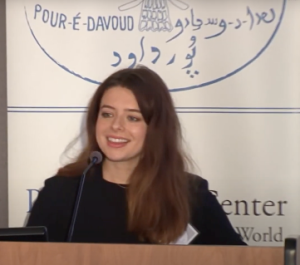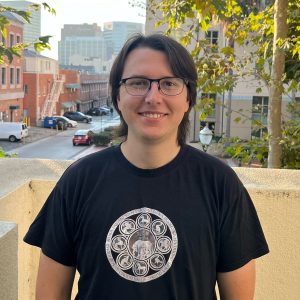The UCLA Pourdavoud Institute for the Study of the Iranian World is pleased to announce the awarding of the Morvarid Guiv Graduate Fellowship in Zoroastrian Studies. This fellowship was established at the Pourdavoud Center in 2018, thanks to a gift from the Trust of Morvarid Guiv. Named after the late Iranian philanthropist Morvarid Guiv, this fellowship endeavors to support graduate students working on all aspects of Zoroastrian studies at UCLA. The gift secured additional matching support from the UCLA Chancellor’s Centennial Scholars Match program.
In its fifth year, this fellowship was awarded to seven successful graduate student applicants, whose works encompass different facets of Zoroastrian studies, that is, the Zoroastrian religion, its ancient history, languages, and scriptures. Each student will be awarded a Morvarid Guiv Graduate Fellowship stipend in the amount of $3,000, which shall be disbursed in $1,000 increments over the course of Fall Quarter 2024, Winter Quarter 2025, and Spring Quarter 2025.
 Hong Yu Chen
Hong Yu Chen
Hong Yu Chen is a sixth-year Ph.D. student in the Near Eastern Languages and Cultures Department at UCLA. He completed his Bachelor’s at The Johns Hopkins University in History and Near Eastern Studies in 2019 and completed his Master’s in Near Eastern Languages and Cultures in 2022 at UCLA. A student of a variety of ancient languages, from Old Persian to Egyptian Demotic, his research focuses on the Egypto-Iranian interactions in the ancient world, utilizing textual sources of the Achaemenid Period to describe and understand strategies of Iranian imperialism in North Africa, its visible impacts upon its conquered subjects, and Iranian culture’s long-lasting legacy upon peoples of both past and present.
 Ethan Friedland
Ethan Friedland
Ethan Friedland is a fourth year PhD student in Iranian Studies. He is primarily interested in studying the development of religious conversion as a radical innovation in Late Antiquity. From its trace origins in the Avesta, he hopes to explore conversion as a Sasanian Zoroastrian legal concept, in conversation with similar developments in Judaism, Christianity, and Manicheism. These inherently destabilizing innovations, involving a transformation or at the very least adaptation of one’s identity, posed a challenge to Iranian practices of empire.
 Charlotte Howley
Charlotte Howley
Charlotte Howley is a third year PhD student in Iranian Studies program at UCLA. She completed her BA in Literae Humaniores at the University of Oxford, where she first gained an interest in ancient Iran, writing an Optional Thesis on the Elephantine Papyri, and learning both Old Persian and Imperial Aramaic over Zoom alongside her studies. She then completed an MSt in Oriental Studies, also at Oxford. Her interests center on the intersection between Gender, Space and Ideology in Achaemenid court culture, links between Mesopotamian and Achaemenid religious and courtly traditions, and the structure of pre-Islamic Iranian palaces.
 Emma Petersen
Emma Petersen
Emma D. Petersen is an Iranian Studies PhD student in the Near Eastern Languages and Cultures Department at the University of California Los Angeles (UCLA). Her research explores the social organization of the Achaemenid Persian Empire (ca. 550–323 BCE) within the context of the broader Afro-Eurasian world. She has a special interest in the minor arts of the empire, including seals, metalware, ceramics, and textile. While a graduate student at UCLA, Emma has additionally held research positions at the University of Chicago and the Getty Research Institute. Since 2017, she has been a team member of the Persepolis Fortification Archive Project, specializing in the study of the archive’s uninscribed tablets. Emma is currently preparing her dissertation on the topic of the Achaemenid royal feast and its role in structuring the imperial paradigm.
 Muhammad Rehan
Muhammad Rehan
Muhammad Rehan completed his undergraduate education at Grinnell College with a degree in German Studies and Classics. During his last year of undergraduate studies, he was introduced to Indo-European Linguistics through Professor Stephanie Jamison’s articles on the connection between Greek epics and Indic legal literature. He continued his education, first in the Classics department as a Post-baccalaureate student and now as a graduate student in the Program in Indo-European Studies at UCLA. His interests remain centered on Sanskrit and Indo-European linguistics, focusing mostly on Greek and Latin, but he also studies Gothic and Anatolian languages and Iranian Linguistics, specially Avestan linguistics. His research focuses on applying computational methodologies to the investigation of linguistic history of Indo-Iranian languages, and he is also interested in problems of traditional Indo-European reconstruction and historical phonology.
 James Scherrer
James Scherrer
James Scherrer is a third year PhD student whose research specializes in Iranian influence on the Eurasian Steppe, particularly in Central Asia and the Black Sea. He completed his bachelor’s degree at the University of California Santa Barbara, where he majored in history and classics. His undergraduate thesis The Empire with a Thousand Faces: State and Subject at the End of the Achaemenid Empire received the history associates board prize for the best undergraduate thesis for the year 2022. His interests also include the intellectual history of the Soviet Union in relation to antique Central Asia and the Black Sea.
 Alexander Youngstrom
Alexander Youngstrom
Alex Youngstrom is a third-year PhD student in the Near Eastern Languages and Cultures department at UCLA, where he studies the Hebrew Bible. He completed his MA in The Bible and the Ancient Near East at The Hebrew University of Jerusalem. His research interests include the reception of the Hebrew Bible in Second Temple Judaism, the Dead Sea Scrolls, linguistic ideology, and scribal culture. He is particularly interested in the influence of Achaemenid administrative scribal practice upon Jewish linguistic ideology and theology in the Second Temple Period.

